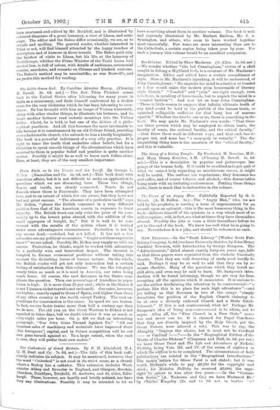Plain Facts as to the Trusts and the Tariff. By
George L. Pollen. (Macmillan and Co. 6s. 6d. net.)—This book deals with American affairs, but it is not difficult to make an application to questions which we are discussing here. These two things, Trusts and tariffs, are closely connected. Trusts do not flourish where there is Free-trade. They have been attempted here, and to an extent of which few are aware, but they have not had any great success. " The absence of a protective tariff," says Mr. Bollen, "places the British consumer in a very different position from that of his American cousin in exposure to trust rapacity. The British trust can only raise the price of its com- modity up to the lowest price abroad, with the addition of the small aggregate of freight, ST." But it is well to be con- versant with the results of the system where it is worked under more advantageous circumstances. Protection is not by any means dead,—scotched, but not killed. It has not a few advocates among political economists. " Ought not these experts to know ?" we are asked. Possibly Mr. Bollen may supply us with an answer. Protection, he thinks, might be worked with advantage by a perfectly wise and benevolent despot. The theorist is tempted to discuss economical problems without taking into account the disturbing forces of human nature. On the whole, the British reader will get not only instruction but a certain feeling of satisfaction from this volume. We use the telegraph nearly twice as much as it is used in America, our rates being much lower. Of course, the vast distances in the States com- plicate the question. Then our percentage of travellers to popu- lation is high. It is more than 25 per cent., while in the States it is not 7 (season-ticket travel isnot reckoned). Our rates, however, are higher; exactly equal to those of Spain, and higher than those of any other country in the world, except Turkey. The vast ex- penditure for construction is the cause. In speed we are beaten. In fact, we ran faster trains more than half a century ago than we do now. The old, run,en the Great Western to Didcot is not equalled in these days, butt we doubt whether it was as much as sixty-eight miles per hour. On p. 436 we find an interesting paragraph, "Our Own Guns Turned Against Us." "All our immense sales of machinery and materials have improved their [the foreigners") capital, and in future competition will be our own guns turned against us. To a large extent, when the rush is over, they will prefer their own makes."










































 Previous page
Previous page